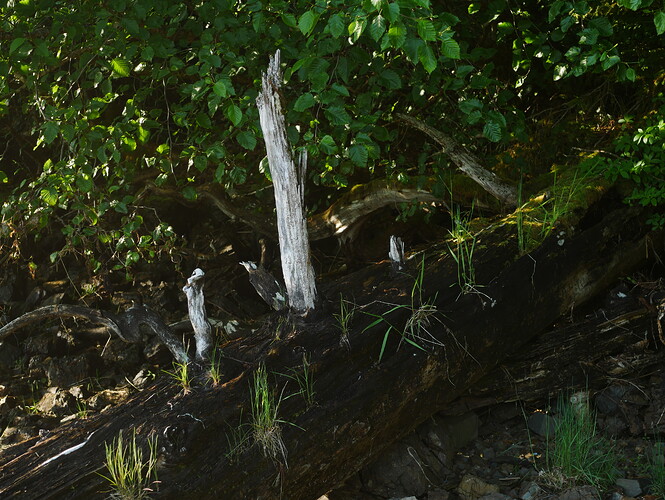Henry: I’ve had a thought which has changed a lot for me.
Hi Henry,
Ha … it’s not the “thought” which was important but the experience of naiveté “which has changed a lot for me”.
Henry: I’ve been at home convalescing for a few days, and it’s funny because it’s been a bit of a vacation from all the action I usually subject myself to – I’m not rushing into town, off to social engagements, to the various sports I like to play – I’m just hanging out at home with my cat, reading and watching various things on the internet, enjoying the sun on the deck. It’s been really lovely, and a peace has been gradually settling like gentle snow.
I remember you were having a similar experience when you returned from a trip out of town for a few days in April –
>>Henry: All it took was for me to get on a plane and fly an hour from home for ‘me’ to go into somewhat of a hibernation (or ‘holiday!’). All these objects, attachments, ‘needs,’ narratives etc. were discarded and forgotten, why pick them up again? (link)
Is it that you have the ability to shift effortlessly into naiveté but don’t yet value and consciously appreciate it enough, thus lacking the intent to remain naive?
Henry: Yesterday was especially magical, so easy and surprising, and delighting & appreciating this peace & ease. Everything was so easy it was like it has always been like this, all my past depressions and anxiety seem like a bad dream only… the insanities across the globe seem incomprehensible from here (though I understand intellectually).
From this space it occurred to me that anyone I come across could be in a PCE – there’s no special cue that tells me in advance, they absolutely could be and I just wouldn’t know. And the peace and delight this thought gave me revealed something – it showed how scared I have been of other people. I have internalized all the nastiness, meanness, anxiety that everyone is capable of, and have recoiled from it – but this thought that they could be in a PCE pierced that narrative.
While the “thought” was imaginary it nevertheless demonstrated experientially that there is no need to “recoil” from other people when you yourself slip into being naïve – liking yourself and hence equally liking others – and suddenly life becomes genuinely magical.
Richard: Maybe it is suffice to say at this stage that I do stress how essential the pure intent of naiveté is … yet because ‘naïve’ and ‘gullible’ are so closely linked (via the trusting nature of a child in concert with the lack of knowledge inherent to childhood) in the now-adult mind most peoples initially have difficulty separating the one from another. Perhaps it may be helpful to report that, when I first re-gained naiveté (which is the closest a ‘self’ can approximate to innocence) at age 33 years, I would exclaim to whoever was prepared to listen that ‘it is like being a child again … but with adult sensibilities’ (naïve but not gullible). I was soon to discover, however, that being child-like is not it – children are not innocent – and that innocence is totally new to anyone’s experience (it is just that a child is more prone to readily allowing the moment to live one, from time-to-time, than a cynical adult is).
Thus the pure intent of naiveté provides the collateral assurance ‘I’ require to safely give ‘myself’ permission to allow this moment to live me (rather than ‘me’ trying to live in the present) and to let go the controls. Yet it is the direct experience itself which is the fundamental factor when it comes to making the curious decision to abandon both one’s present course and that of one’s peers and plunge into the adventure of a lifetime. (Richard, List B, No. 25f, 22 Jun 2000))
Henry: Suddenly now I’m seeing everyone as a potential collaborator in the fun to be had, rather than someone that might hurt me, an enemy. I have even weaponized actualism, as in “aren’t people so terrible” and thus to be avoided.
The “weaponizing” of what you call ‘actualism’ has its source in not liking yourself, i.e. resent in yourself the ‘bad’ aspects of the human condition. Once you become guileless yourself and like yourself as you are – a product of the genetic heritage everyone is afflicted with – coupled with the sincere intent of doing something about it, then the world becomes a veritable playground.
Henry: And now I can see how it is for a free person – they only meet the actual person. There is no need to recoil – there is appreciation, liking the actual person that they are. And that requires not putting up a defensive wall, I have to really see them, allow that intimacy to occur. And I can see how easy it is to do that now, actually it’s a joy to do because of all the fun to be had.
Be careful to not make a moral or ethical command out of your insight – as in “I have to really see them”. Seeing “how easy it is to do that now”, your intent to allow it is sufficient.
Henry: It doesn’t matter if they’re not in a PCE – they probably are not – because it’s clear now that they were never hurting me anyway, it was always me hurting myself. I was ‘protecting’ myself, but all it was doing was keeping this resentment and fearfulness alive. In this space, it’s evident how meagre that life was – no wonder I felt like I was missing something, I absolutely was! (link)
Indeed, it does not matter at all that “they’re not in a PCE” (it was only a fantasy anyway) – because when you are “traipsing through the world about in a state of wide-eyed wonder and amazement as if a child again (guileless, artless, ingenuous, innocuous) – yet with adult sensibilities whereby the distinction betwixt being naïve and being gullible is readily separable” (Richard, List D, No. 4b, 4 Jul 2015)) then you are leaving “resentment and fearfulness” far behind and fun and gaiety are available in abundance and yours for the choosing. When you allow naiveté to flourish everyone is a fellow human being and as likeable as you are.
All that is required now is a sincere attentiveness so as to not habitually slip back into ‘your’ still familiar world of fear and sorrow.
Cheers Vineeto





